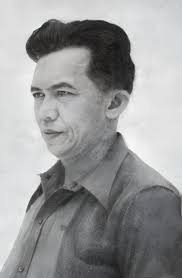
Tan Malaka
The Indonesian nation that has become independent is not just begging for independence. Hundreds of years have passed for this nation with blood, tears and sweat due to colonialism which hit the lives of the Indonesian people before independence. In the struggle, many figures were involved who were given the title “Heroes” for their services which had a big impact on Indonesia’s success in expelling the invaders, either through diplomacy or physical means. In fact, heroes don’t always have good names. In fact, heroes do not always have a good image according to some people. In facts, some heroes got bad reputation. This hero is called Tan Malaka, a revolutionary figure who is nicknamed the “Father of the Republic of Indonesia” which is certainly a nickname that he did not get without reason. His real name was Ibrahim Gelar Datuk Sutan Malaka, who was later better known as Tan Malaka.
Born in Pandam Gadang, Gunuang Omeh, Lima Puluh Kota in West Sumatra Province on June 2 1897. Apart from being a hero figure in the eyes of the people, Tan Malaka is also known as a diplomat, philosopher and writer who is good at playing with words. This is proven by his books which are timeless and have become a legacy for Indonesian youth. Some of his works that are legendary and have become his theoretical contribution to the nation are a book entitled “Madilog” which contains an understanding of materialism, dialectics and logic, as well as another book entitled “Gerpolek” which contains about guerrillas, politics and economics.
In his struggle for Indonesia, Tan Malaka did not only fight by staying in one place but he used various methods such as diplomacy, becoming a guerrilla, and many times going undercover until he became a fugitive. It is not uncommon for Tan Malaka to be thrown back and forth in domestic and foreign prisons. Tan Malaka spent his life traveling abroad. His exploration abroad made Tan Malaka learn a lot about various political viewpoints and ideologies during his life, making him a figure who was aware of the political conditions in Indonesia at that time.
Especially after seeing Indonesia’s crisis and colonial pressures upon his return from Europe. Tan Malaka got various ideas for struggle and revolution. One of the books that brought revolution, written by him as a native Indonesian who wanted to escape colonialism, was “Naar de Republiek Indonesia” or Towards the Republic of Indonesia, which was released in 1925. This book, written during his exile, sparked Tan Malaka’s idea about the concept of the Republic of Indonesia when it becomes a complete country that surpasses other people’s immature thought plans at that time. Thus, Tan Malaka received the nickname Father of the Republic of Indonesia by Muh.
Yamin because of his visionary ideas regarding the concept of forms of government. The book contains the situation in Indonesia and the world that he has been observing. He was active in carrying out domestic politics and participated in all kinds of independence movement organizations.
Tan Malaka is a figure who adheres to an ideology that agrees with Karl Marx or Marxism, namely socialist-communist. His existence and his title as Indonesia’s National Hero are considered controversial and give rise to pro and con arguments to this day. This emerging perspective is not without reason, this is because Tan Malaka follows the ideology of the left front movement or Marxism-Communism which does not agree with the ideology of Pancasila.
Tan Malaka was one of the founders of the Indonesian Communist Party (PKI) which even had strong ties with society at that time, and was also a representative of the Comintern or an organization that brought together communist parties in various countries. In contrast to the PKI during the leadership of Tan Malaka, the PKI had a dark history for Indonesia until it was eradicated in 1965, but the communist rebellion occurred after he was exiled and many years after he died. It is suspected that Tan Malaka also rejected the idea of a PKI rebellion in 1926.
Tan Malaka embraced communism only as an idea or thought without any other aim as a form of rejecting capitalists and colonialists. His image today is not always good because of his involvement in the founding of the PKI, the PKI rebellion that occurred, which banned the ideology of Marxism-Communism, also gave rise to bad stereotypes in society towards heroes who had Communist ideology in the past.
In 1945, Tan Malaka proposed himself as a replacement for Indonesia’s leader when President Soekarno and Vice President Moh. Hatta was captured by colonial troops at that time. The proposal was also agreed upon based on reaching consensus at the meeting. Until finally in 1948 the kidnapping of Ir. Soekarno and Drs. Moh. Hatta and Tan Malaka filled the empty figure of a leader at that time. Unfortunately, even though an agreement had been reached, Tan Malaka was seen as a rebel who wanted to seize presidential power at that time.
At the end of his life, Tan Malaka had to die from the bitterness of being shot by his own nation’s rifle for which he had been fighting all this time. He died in 1949, on February 21 to be precise. Even so, no one can deny the persistence of the call for independence and its contribution in fighting for independence for Indonesia. Tan Malaka always consistently rejected colonialism and refuse any collaboration with colonialists. Tan Malaka will always receive the title of National Hero. His role in various sectors of struggle had a big influence on young people, he was an inspirational figure for young people in fighting for their independence rights. Even now he is a figure who inspires the younger generation to change Indonesia for the better.
By: Raysha Azmi Arroyan
Write and Win: Participate in Creative writing Contest & International Essay Contest and win fabulous prizes.


